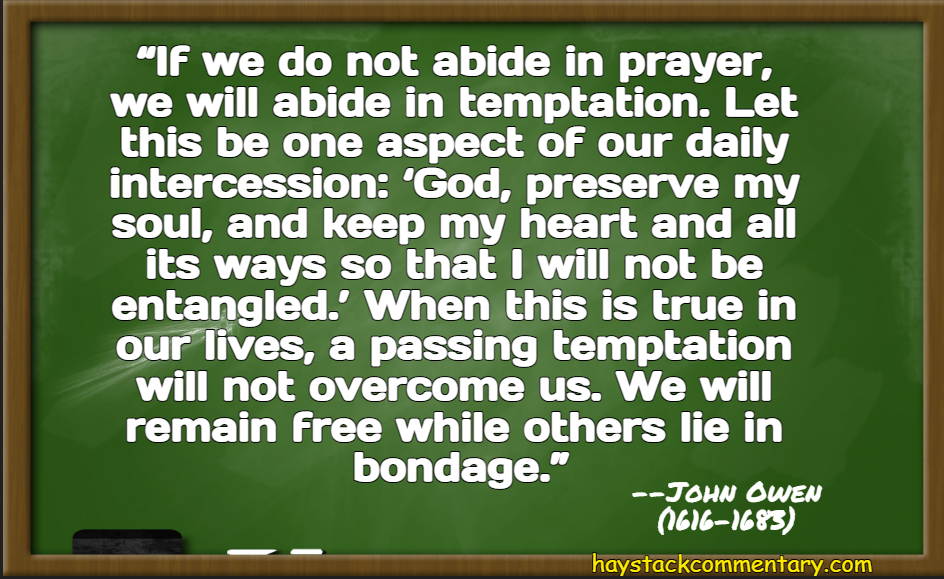Prayer
Prayer in the Desert Times
When the Prophet Elijah flees from Jezebel after a bit of a triumph in his ministry, he winds up in a cave at Horeb where he encounters God. God is not in a wind, or earthquake, or fire, but in the “sheer silence” as the NRSV translates it, or as other translations put it, a “still, small, voice” (1 Kings 19:11-12). My experience is silence is overly blessed yet seldom sought. It is silence that illuminates the distracting voices of the present so we can listen for the true voice of the one whom we seek. I was reminded recently after meeting with my spiritual director of a formative time of prayer in which I learned the beauty of silence, of contemplation, and of the gift of prayer. In fact, in being reminded of this experience, I realized that my habits of prayer, my comfort in leading corporate prayer, and my sense of the Holy Spirit’s presence and God’s providence were all rooted in this formative time. After Elijah encounters God in the sheer silence, God tells Elijah to go find Elisha, who will become his successor. In the sheer silence, Elijah is reminded there’s still more to God’s calling on his life. One way to imagine God’s calling is as a hymn whose verses keep being written. Using this metaphor, the verses are being written until our last breath, or until Jesus returns. The refrain gives assurance that the hymn of life is still being sung. God is always doing something new, God is still writing the verses of our callings. Silence, like the refrain of a hymn, re-centers us, reminds us, and connects us, so we can go onto the next verse and season God has for us. (Reformed Journal 5/27/24) READ MORE>>>>>
When the Prophet Elijah flees from Jezebel after a bit of a triumph in his ministry, he winds up in a cave at Horeb where he encounters God. God is not in a wind, or earthquake, or fire, but in the “sheer silence” as the NRSV translates it, or as other translations put it, a “still, small, voice” (1 Kings 19:11-12). My experience is silence is overly blessed yet seldom sought. It is silence that illuminates the distracting voices of the present so we can listen for the true voice of the one whom we seek. I was reminded recently after meeting with my spiritual director of a formative time of prayer in which I learned the beauty of silence, of contemplation, and of the gift of prayer. In fact, in being reminded of this experience, I realized that my habits of prayer, my comfort in leading corporate prayer, and my sense of the Holy Spirit’s presence and God’s providence were all rooted in this formative time. After Elijah encounters God in the sheer silence, God tells Elijah to go find Elisha, who will become his successor. In the sheer silence, Elijah is reminded there’s still more to God’s calling on his life. One way to imagine God’s calling is as a hymn whose verses keep being written. Using this metaphor, the verses are being written until our last breath, or until Jesus returns. The refrain gives assurance that the hymn of life is still being sung. God is always doing something new, God is still writing the verses of our callings. Silence, like the refrain of a hymn, re-centers us, reminds us, and connects us, so we can go onto the next verse and season God has for us. (Reformed Journal 5/27/24) READ MORE>>>>>
Church-community connection: Don’t ever underestimate prayer
One thing I have learned in 43 years of ministry is to never, never, ever, ever underestimate the power of prayer. We, the people, tend toward self-reliance, which often gets in the way of our need for prayer. We want to do everything on our own. Think about it. Prayer invites God to be involved in our lives. I’ve discovered that ministry is doing what God just said to do in a prayer. Author Corrie Ten Boom asks this question about prayer: “Is prayer your steering wheel or your spare tire?” In other words, is prayer your first resort or last resort? Ten Boom challenges us as people and a nation to make prayer a first resort rather than a last resort. She’s trying to get us to embrace something most of us already know about. She’s not saying anything new. She’s saying it in a way that hopefully will move us from knowledge about prayer to the application of prayer, especially for our nation right now.
(Ed Delph/Glendale Star 11/19/23)
READ MORE>>>>>
One thing I have learned in 43 years of ministry is to never, never, ever, ever underestimate the power of prayer. We, the people, tend toward self-reliance, which often gets in the way of our need for prayer. We want to do everything on our own. Think about it. Prayer invites God to be involved in our lives. I’ve discovered that ministry is doing what God just said to do in a prayer. Author Corrie Ten Boom asks this question about prayer: “Is prayer your steering wheel or your spare tire?” In other words, is prayer your first resort or last resort? Ten Boom challenges us as people and a nation to make prayer a first resort rather than a last resort. She’s trying to get us to embrace something most of us already know about. She’s not saying anything new. She’s saying it in a way that hopefully will move us from knowledge about prayer to the application of prayer, especially for our nation right now.
(Ed Delph/Glendale Star 11/19/23)
READ MORE>>>>>
|
May 1, 2023: Breathing Space: We Don’t Need the National Day of Prayer
We don’t need the National Day of Prayer. It promotes American Christian Nationalism that pushes groupthink in the name of religion. |
For as long as I can remember, growing up in southern evangelical churches, I heard people saying, “If only we’d overturn Roe v. Wade,” or “If only we’d bring back prayer in schools,” or “If only stores and restaurants were still closed on Sundays…” In all these things, what they’re really saying is, “If only we could return to the days when Christians were in such a majority that we could legislate morality for everyone else.” 5.1.23 |
|
Jan 8, 2023: Ask Dr Brown: In Times of Crisis Americans Pray
Around the nation, in response to the life-threatening injury to Buffalo Bills football player Damar Hamlin, people prayed. Hamlin’s teammates and coaches prayed. Millions of fans joined in prayer, tweeting their support. 
Worship and intercession must go together; one is impossible without the other. Intercession means raising ourselves up to the point of getting the mind of Christ regarding the person for whom we are praying. When we lose sight of God, we become hard and dogmatic. We throw our petitions at His throne and dictate to Him what we want Him to do.
“We don’t worship God, nor do we seek to conform our minds to the mind of Christ. And if we are hard toward God, we will become hard toward other people.” One of the most subtle and illusive burdens God ever places on us as saints is this burden of discernment concerning others. “He gives us discernment so that we may . . . form the mind of Christ about them (see Philippians 2:5). “We should intercede . . . to bring God into contact with our minds, that we awaken ourselves to the point where God is able to convey His mind to us regarding the people for whom we intercede. -Oswald Chambers |
“A Christian fellowship lives and exists by the intercession of its members for one another, or it collapses. I can no longer condemn or hate a brother for whom I pray, no matter how much trouble he causes me. His face, that hitherto may have been strange and intolerable to me, is transformed in intercession into the countenance of a brother for whom Christ died, the face of a forgiven sinner.” ― Dietrich Bonhoeffer, Life Together: The Classic Exploration of Christian Community |

But don’t intercede for sin
In Jeremiah 7, the word of the LORD warned the people against continuing in their evil ways. He reminded them of his promises to bless them. He reminded them of the danger of turning away from him. But they wouldn’t listen. Therefore pray not thou for this people, neither lift up cry nor prayer for them, neither make intercession to me: for I will not hear thee. (Jeremiah 7:16) If any man see his brother sin a sin which is not unto death, he shall ask, and he shall give him life for them that sin not unto death. There is a sin unto death: I do not say that he shall pray for it. (1 John 5:16) -Bible Truths 1 Timothy 2:1: I urge you, first of all, to pray for all people. Ask God to help them; intercede on their behalf, and give thanks for them.”
|
James 5:16: The earnest prayer of a righteous person has great power and produces wonderful results.

One of the concerns we often have about our prayer ministry is that the requests we receive are overwhelmingly for those who are sick. Now there is no doubt that the church is called to pray for the sick. But so often it seems the church is just absolutely obsessed with praying sick sinners out of heaven and totally oblivious to praying lost sinners out of hell.
We need to have the right priority when it comes to our intercession. It’s about praying for “Christ’s Kingdom to come and His will be done on earth as it is in heaven.” That means focusing on the spiritual welfare of the church and its mission, as we remember the physical needs of those who are sick. There is also an erroneous idea in contemporary Christianity that those who offer up intercessory prayers are a special class of “super-Christians,” called by God to a specific ministry of intercession. The Bible is clear that all Christians are called to be intercessors. All Christians have the Holy Spirit in their hearts and, just as He intercedes for us in accordance with God’s will (Romans 8:26-27), we are to intercede for one another. -Right From the Heart |
Spend time in preparing what you will pray, the shape of your prayers, and how you will pray. You might like to include a special prayer which you will pray at the start and finish of your prayers. You might like to include a responsive prayer, for the congregation to pray. So, for example, at the end of each section of your prayers, you could pray, ‘Heavenly father, hear our prayers’, and the congregation could then pray, ‘through Jesus Christ our saviour’.
Prayers which are prepared are not less spiritual than prayers which are spontaneous. We sing prepared songs, many of which are prayers. And the Lord’s prayer is a prepared prayer!
You could write out all that you will say; you could write out some parts, and use headings for the rest; or you might just write out an outline. But whether you write something or not, prepare for this important task of public ministry. -Peter Adam;Gospel Coalition
Prayers which are prepared are not less spiritual than prayers which are spontaneous. We sing prepared songs, many of which are prayers. And the Lord’s prayer is a prepared prayer!
You could write out all that you will say; you could write out some parts, and use headings for the rest; or you might just write out an outline. But whether you write something or not, prepare for this important task of public ministry. -Peter Adam;Gospel Coalition

When you intercede on behalf of another, you are asking God to hold back judgment from a person or persons who provoked judgment upon themselves through their wrongdoing. Normally, intercession is made for those who are lost. Jesus identified with fallen humanity to bring our deliverance. Through love and compassion, you also identify with those for whom you pray.
If the ones who have sinned and caused judgment to come on themselves don't turn and repent, the only hope for judgment to be prevented is for someone to intercede for them.
God doesn't enjoy seeing people judged, so He looks for people of prayer to stand in the gap and intercede in order that lives can be spared. He said, "I sought for a man among them, that should make up the hedge, and stand in the gap before me for the land, that I should not destroy it: but I found none" (Ezek. 22:30).
In Genesis 18:23-32, Abraham's prayer for Sodom and Gomorrah is a clear example of the prayer of intercession. Under the Old Covenant, Abraham interceded for people and God heard him. How much more will God hear your prayers for your lost loved one, city, and nation under the New Covenant?
You are a covenant child of God, just as Abraham was. And you have the authority in the Name of Jesus to help others through prayer and intercession! -Kenneth Hagin
If the ones who have sinned and caused judgment to come on themselves don't turn and repent, the only hope for judgment to be prevented is for someone to intercede for them.
God doesn't enjoy seeing people judged, so He looks for people of prayer to stand in the gap and intercede in order that lives can be spared. He said, "I sought for a man among them, that should make up the hedge, and stand in the gap before me for the land, that I should not destroy it: but I found none" (Ezek. 22:30).
In Genesis 18:23-32, Abraham's prayer for Sodom and Gomorrah is a clear example of the prayer of intercession. Under the Old Covenant, Abraham interceded for people and God heard him. How much more will God hear your prayers for your lost loved one, city, and nation under the New Covenant?
You are a covenant child of God, just as Abraham was. And you have the authority in the Name of Jesus to help others through prayer and intercession! -Kenneth Hagin

Seven Steps for Intercessory Prayer
- Since it is the prayer of the righteous that is powerful and effective (James 5:16), examine your conscience before you pray, and repent of any sin or harsh feelings you may have against other people.
- Spend a few minutes in silence, to quiet your mind and come into God's presence.
- During this time, ask the Lord to give you a sense of the things God wants you to pray for. Put aside your own agenda, concerns, and desires and unite yourself to Jesus' heart. You may want to write down the things that God places on your hearts.
- Briefly reflect on what you wrote down. What do you think God is leading you to pray for?
- Pray for the things on God's heart—for those who have no faith; for those who have fallen away from Jesus; for renewal and unity in all the Christian churches; for respect for all life; for all the lost, abandoned, or forgotten children of the world; for those under the power of addictions or bound by depression, anxiety, or bitterness; and for prisoners and service men and women. And, of course, pray for your own intentions and those of your loved ones.
- As you pray, take confidence in God’s power to overcome any obstacle. Stand firm in faith, and wait to see God work in power.
- In your prayer journal, keep a record of what you prayed for, and of the ways God answered those prayers. Thank him and praise for all the ways he has worked through your prayer. -Christ Life

Intercession is a step from prayer.
Intercession is praying God’s heart into a specific situation or standing in the gap on behalf of a person or a region in need of mercy and grace.
Intercession makes requests, pleads, begs, discusses, sacrifices; and makes war against the enemy of God relating to those who are weak and spiritually blind to truth and the deception of Satan.
An intercessor is someone who petitions God in favor of another person.
Your prayers of intercession can unleash God’s power in the lives of those you love.
2 Corinthians 2:16 says we can be a fragrance that leads others to Christ.
Matthew 5:13-14, “You are salt on the earth. But if the salt has loses its saltiness how can it be made salty again. It is no longer good for anything except to be thrown out and trampled by man. You are the light of the world. A city on a hill cannot be hidden”
That scripture is saying we are salt and light, bringing warmth and radiance by our prayers and the spiritual battles against the enemy for those we love.
Our prayers penetrate the battle scene.
The enemy wants to destroy those we love.
So many times, they are blinded to the deception of Satan and the power they can have in Christ.
Our prayers can melt down the spiritual resistance through the Holy Spirit.
We must allow the Holy Spirit to search our hearts and cleanse anything that restricts
His power and our intercession role in the lives of those we love and intercede for.
Don’t allow the busyness and the world’s culture to blind your eyes and rob you of the power that is available to you through the Holy Spirit. -Mickey Elliot
Intercession is praying God’s heart into a specific situation or standing in the gap on behalf of a person or a region in need of mercy and grace.
Intercession makes requests, pleads, begs, discusses, sacrifices; and makes war against the enemy of God relating to those who are weak and spiritually blind to truth and the deception of Satan.
An intercessor is someone who petitions God in favor of another person.
Your prayers of intercession can unleash God’s power in the lives of those you love.
2 Corinthians 2:16 says we can be a fragrance that leads others to Christ.
Matthew 5:13-14, “You are salt on the earth. But if the salt has loses its saltiness how can it be made salty again. It is no longer good for anything except to be thrown out and trampled by man. You are the light of the world. A city on a hill cannot be hidden”
That scripture is saying we are salt and light, bringing warmth and radiance by our prayers and the spiritual battles against the enemy for those we love.
Our prayers penetrate the battle scene.
The enemy wants to destroy those we love.
So many times, they are blinded to the deception of Satan and the power they can have in Christ.
Our prayers can melt down the spiritual resistance through the Holy Spirit.
We must allow the Holy Spirit to search our hearts and cleanse anything that restricts
His power and our intercession role in the lives of those we love and intercede for.
Don’t allow the busyness and the world’s culture to blind your eyes and rob you of the power that is available to you through the Holy Spirit. -Mickey Elliot

Where are the faithful intercessors? As intercessors we operate and move in two worlds, the physical and spiritual. Therefore, it is imperative to guard your spiritual post. Any effective intercessor must have a quiet place to get away and be alone. “Be still, and know that I am God” (Ps. 46:10). On many occasions Jesus went to a solitary place to pray and to be alone, especially right after ministering. “Very early in the morning, while it was still dark, Jesus would arise and go to a solitary place, where He prayed” (Mark 1:35)
Another requirement for effective intercession is being righteous before God. That means to confess and repent of un-confessed sin and clothe yourselves in righteousness. When it seems as though you have difficulty getting into the presence of God, begin by sitting still and begin to speak in your heavenly language (tongues) for it makes your faith stronger. “But ye, beloved, building up yourselves on your most holy faith, praying in the Holy Ghost” (Jude 20). - Igniting The Fire
Another requirement for effective intercession is being righteous before God. That means to confess and repent of un-confessed sin and clothe yourselves in righteousness. When it seems as though you have difficulty getting into the presence of God, begin by sitting still and begin to speak in your heavenly language (tongues) for it makes your faith stronger. “But ye, beloved, building up yourselves on your most holy faith, praying in the Holy Ghost” (Jude 20). - Igniting The Fire
If the heart doth not go along in prayer, it is speaking, not praying. Prayer is called a wrestling, a pouring out the soul. Prayer without fervency, is like incense without fire. Spiritual prayer is believing prayer. "Whatsoever ye shall ask in prayer, believing, ye shall receive." The reason why so many prayers suffer shipwreck, is because they split against the rock of unbelief. Spiritual prayer is holy prayer. Prayer must be offered upon the altar of a pure heart. Spiritual prayer is humble prayer. Spiritual prayer is when we pray in the name of Christ—to pray in the hope and confidence of Christ's mediation. Spiritual prayer is when we have spiritual ends in prayer. --Thomas Watson
Not only does prayer impact your “self-talk,” prayer effects what you say to others and how you say it. Talking to God empowers you to boldly speak the truth in love (Ephesians 4:15). Your communication with God reflects itself in your communication with others (Colossians 4:6). If your prayers are one-way where you talk, and God listens, then you may struggle to listen to others and allow them to speak without interruption. The continual practice of listening, not just talking, to God strengthens your ability to listen to others.
After teaching his disciples about prayer, Jesus, the perfect pattern, taught his disciples to speak in faith to the situations in their lives, which appeared to be mountains. He reminded them of the power of their words and the ability that they had to create the lives that they desired and deserved. You have that same authority to drown the mountains of your life in the sea of God’s presence.
“…If anyone says to this mountain, ‘Go, throw yourself into the sea,’ and does not doubt in their heart but believes that what they say will happen, it will be done for them (Mark 11:23).”
After teaching his disciples about prayer, Jesus, the perfect pattern, taught his disciples to speak in faith to the situations in their lives, which appeared to be mountains. He reminded them of the power of their words and the ability that they had to create the lives that they desired and deserved. You have that same authority to drown the mountains of your life in the sea of God’s presence.
“…If anyone says to this mountain, ‘Go, throw yourself into the sea,’ and does not doubt in their heart but believes that what they say will happen, it will be done for them (Mark 11:23).”
|
Prayer reminds you that your biggest life struggles exist inside, not outside, of you. Real prayer always leaves you humbled because real prayer requires you to admit who you really are. We would all like to think we’re fundamentally good people whose biggest struggles in life exist outside, not inside, of us. But prayer confronts us with a humbling reality: we’re only hooked by the evil outside of us because of the evil inside of us.
Prayer requires us to face the fact that no matter what we suffer, the deepest, most abiding dilemma of our life exists inside, not outside, of us. Prayer requires us to face the dark and devastating reality of our sin and how it distorts what we think, desire, say, and do. Prayer requires us to acknowledge that we need rescue and protection because we carry around something inside ourselves that tempts us away from what is right toward what is wrong. Prayer humbles us as it welcomes us to admit that we carry around something inside that is self-focused and antisocial and therefore destructive to ourselves and to our relationships. Prayer requires us to confess that the biggest problem in our lives, the one thing we cannot escape by change of situation and location, is ourselves! It’s our sin that seduces, deceives, and entraps us again and again. It’s our sin that causes us to want things we shouldn’t want, to think things we shouldn’t think, to say things we shouldn’t say, and to do things we shouldn’t do. Prayer calls us to quit blaming our circumstances and relationships for our words and actions. Prayer welcomes us to accept responsibility for our behavior and, as we do, to receive forgiveness and help. Prayer destroys the finger-pointing, it’s-your-fault, blame game that paralyzes us. When you’re deeply persuaded that your hope in life is to get everything around you fixed, and the people around you are deeply persuaded of the same, you can be sure that nothing will get fixed. It’s only when you and your neighbor both confess that it’s the sin inside that leads you both to do what’s wrong—not the failure of the other—that each hungers for growth and change and then reaches out for God’s help. Change always begins with looking within, and that’s exactly where prayer calls us to look. The celebration of a Savior, which lies at the heart of prayer, makes sense only when we acknowledge that we can’t escape from the sin inside us. When we acknowledge our sin, we quit blaming people, places and situations and begin getting serious about getting help. Prayer reminds you again and again that your biggest, most abiding problem is you. “For yours is the kingdom and the power and the glory forever. Amen.” Prayer reminds you that the key to real life is found in an allegiance to God’s kingdom and not your own. True heartfelt prayer ends as it begins—with recognition of God’s kingship and his glory. Prayer reminds you that life isn’t about you. Prayer reminds you that the center of your universe is a place reserved for God and God alone. Prayer reminds you that real peace, satisfaction, and contentment come when you live for a greater glory than your own. Prayer reminds you that hope in life isn’t found in building your own kingdom but in submitting to the wisdom and rule of a better King. Prayer calls you away from the kingdom of self, which is so destructive to everything life is intended to be, and welcomes you to the kingdom of God, where a God of love rules in wisdom and love. --Paul Tripp Ministries |
|
Nov 19, 2021: Southern Equip: How God Helps Us Pray According to His Will
To pray the Bible, you simply go through a passage line by line, talking to God about whatever comes to mind as you read the text. See how easy that is? Anyone can do that.
To pray the Bible, you simply go through a passage line by line, talking to God about whatever comes to mind as you read the text. See how easy that is? Anyone can do that.
"This is Puritan advice. It does not simply mean that persistence should mark much of our praying—though admittedly that is a point the Scriptures repeatedly make. Even though he was praying in line with God’s promises, Elijah prayed for rain seven times before the first cloud appeared in the heavens. . . . That is not quite what the Puritans mean when they exhorted one another to “pray until you pray.” What they mean is that Christians should pray long enough and honestly enough, at a single session, to get past the feeling of formalism and unreality that attends not a little praying. We are especially prone to such feelings when we pray for only a few minutes, rushing to be done with a mere duty. To enter the spirit of prayer, we must stick to it for a while. If we “pray until we pray,” eventually we come to delight in God’s presence, to rest in his love, to cherish his will. Even in dark or agonized praying, we somehow know we are doing business with God. In short, we discover a little of what Jude means when he exhorts his readers to pray “in the Holy Spirit” (Jude 20)—which presumably means it is treacherously possible to pray not in the Spirit."
--DA Carson (Praying With Paul: A Call to Spritual Reformation)
--DA Carson (Praying With Paul: A Call to Spritual Reformation)








